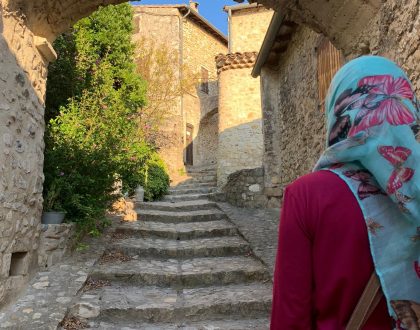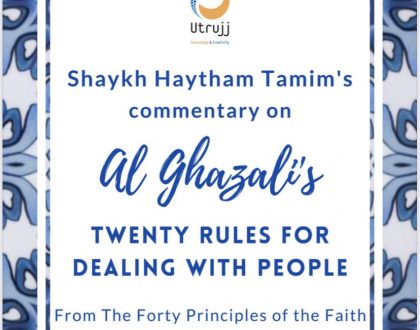Ghazali on remembering death V – carrying jewels
Acute regret Imagine you are in a dark cave filled with stones, and your friends urge you to pick up the stones and carry them back with you to the exit. You think they...
Read More
Ghazali on remembering death I
Remembering Death The tenth and final chapter of The Forty Principles of the Faith is about death. Imam Ghazali chose to end his book, which is a summary of the great tome, Ihya Ulum...
Read More
Ghazali on Contentment with Allah’s Will (part 1)
Allah is pleased with them and they are pleased with Him In Surat al Maidah, Allah Almighty says: قَالَ ٱللَّهُ هَٰذَا يَوۡمُ يَنفَعُ ٱلصَّٰدِقِينَ صِدۡقُهُمۡۚ لَهُمۡ جَنَّٰتٞ تَجۡرِي مِن تَحۡتِهَا ٱلۡأَنۡهَٰرُ خَٰلِدِينَ فِيهَآ أَبَدٗاۖ...
Read More
Ghazali on love (part 3) – The pleasure of seeing Allah and the signs He loves you
This is the last part of Ghazali’s chapter on love. He already mentioned that the senses are our gateway to pleasure and we love everything that is pleasurable to our senses. However there is...
Read More
Ghazali on love (part 2)
Why do we love the Prophet (peace be upon him)? Ghazali likes to link every topic to its roots to examine it. How do we develop love? Ghazali already mentioned that we find everything...
Read More
Ghazali on love (part 1)
Ghazali lived in 5th century Hijri and his book, Kitaab Al-Arba’in Fi Usul ad-Din, ‘The Forty Principles of the Religion,’ which he wrote before his death, is a summary of Ihya Ulumuddin (Revival of...
Read More
Ghazali on the 6 levels of truthfulness
Ghazali lived in 5th century Hijri and his book, Kitaab Al-Arba’in Fi Usul ad-Din, ‘The Forty Principles of the Religion,’ which he wrote before his death, is a summary of Ihya Ulumuddin (Revival of...
Read More
Ghazali on sincerity – transforming an inferior act into a superior act
The connect / disconnect between the heart and tongue Ghazali says intention is not determined by what you say, but by a deeper motivation. Simply verbalising something is not a true indication that you...
Read More
Ghazali on shukr (gratitude)
Ghazali lived in 5th century Hijri and his book, Kitaab Al-Arba’in Fi Usul ad-Din, ‘The Forty Principles of the Religion,’ which he wrote before his death, is a summary of Ihya Ulumuddin (Revival of...
Read More
Ghazali’s 20 rules for dealing with people
Life is a journey to Allah which we do not pursue alone. We are not an island – we are surrounded by people, friends, family, colleagues, neighbours, those whom we employ and those we...
Read More
Ghazali on sabr (part 2)
Ghazali lived in 5th century Hijri and his book, Kitaab Al-Arba’in Fi Usul ad-Din, ‘The Forty Principles of the Religion,’ which he wrote before his death, is a summary of Ihya Ulumuddin, and his...
Read More
Ghazali on Zuhd – levels and motivation
Ghazali lived in 5th century Hijri and his book, Kitaab Al-Arba’in Fi Usul ad-Din, ‘The Forty Principles of the Religion,’ which he wrote before his death, is a summary of Ihya Ulumuddin, and his...
Read More
Ghazali on Zuhd
Ghazali lived in 5th century Hijri and his book, Kitaab Al-Arba’in Fi Usul ad-Din, ‘The Forty Principles of the Religion,’ which he wrote before his death, is a summary of Ihya Ulumuddin, and his...
Read More
Without reconciliation we can never be a strong Ummah
In Surat Al Anfal, Allah Almighty said: يَسْأَلُونَكَ عَنِ الْأَنفَالِ ۖ قُلِ الْأَنفَالُ لِلَّهِ وَالرَّسُولِ ۖ فَاتَّقُوا اللَّهَ وَأَصْلِحُوا ذَاتَ بَيْنِكُمْ ۖ وَأَطِيعُوا اللَّهَ وَرَسُولَهُ إِن كُنتُم مُّؤْمِنِينَ They ask you about the bounties....
Read More
Ghazali on fear (khawf). Part 2
Ghazali lived in 5th century Hijri and his book, Kitaab Al-Arba’in Fi Usul ad-Din, ‘The Forty Principles of the Religion,’ which he wrote before his death, is a summary of Ihya Ulumuddin, and his...
Read More















